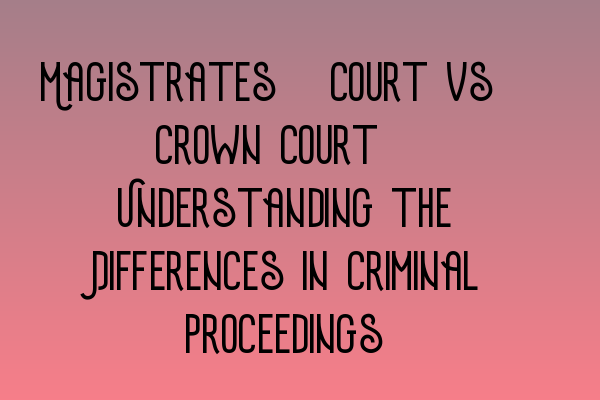Magistrates’ Court vs. Crown Court: Understanding the Differences in Criminal Proceedings
When it comes to criminal proceedings in the United Kingdom, two courts play a vital role in the criminal justice system:
the Magistrates’ Court and the Crown Court. Understanding the differences between these two courts is essential for both legal
professionals and individuals involved in criminal cases. This article aims to shed light on the distinctions between the
Magistrates’ Court and the Crown Court and provide a better understanding of their roles and responsibilities.
Magistrates’ Court
The Magistrates’ Court is the lower court in the UK criminal justice system. It is primarily responsible for handling
summary offenses and preliminary hearings for more serious offenses. Magistrates, also known as justices of the peace, preside
over the court proceedings. These magistrates are laypeople, meaning they are not professional judges but are appointed to
serve in their community’s best interest.
Summary offenses, such as minor traffic offenses and petty crimes, generally start and conclude in the Magistrates’ Court.
The proceedings in this court are relatively quick, and the focus is on determining guilt or innocence rather than complex
legal arguments.
If an offense is more serious and requires a trial or sentencing by a judge, the Magistrates’ Court has the power to send the
case to the Crown Court. This process is known as “sending” or “committing” the case, and it typically happens when the
offense carries a potential sentence of imprisonment exceeding the Magistrates’ Court’s maximum sentencing powers.
It’s important to note that some cases are considered “either-way offenses” and can be heard in either the Magistrates’
Court or the Crown Court. The defendant often has the opportunity to elect the court of their choice for these offenses.
Crown Court
The Crown Court, on the other hand, is a higher court that deals with more serious criminal cases. It has the authority to
hear both verdict and sentencing for a wide range of offenses. The Crown Court comprises professional judges and a jury
selected from the general public, ensuring a fair and unbiased legal process.
Trials in the Crown Court are typically more complex than those in the Magistrates’ Court. The focus is not only on
determining guilt or innocence but also on the examination of evidence and legal arguments from both the prosecution and the
defense.
Unlike the Magistrates’ Court, the Crown Court can impose longer sentences, including life imprisonment, depending on the
severity of the offense. The judge determines the appropriate sentence after considering the facts of the case, any previous
convictions, and any mitigating or aggravating factors.
Furthermore, the Crown Court may also hear appeals from the Magistrates’ Court if either the prosecution or the defendant is
dissatisfied with the decision or the sentence imposed.
Conclusion
In summary, the Magistrates’ Court and the Crown Court serve distinct roles in the UK criminal justice system. The Magistrates’
Court handles summary offenses and preliminary hearings, while the Crown Court deals with more serious criminal cases, trials,
and sentencing. Understanding the differences between these two courts is crucial for legal professionals and individuals
involved in criminal proceedings. Whether you find yourself in the Magistrates’ Court or the Crown Court, it is essential to
be familiar with the legal processes and seek professional legal advice to navigate through the complexities of the criminal
justice system.
For more information on legal exams and preparation, you can check out related articles:
